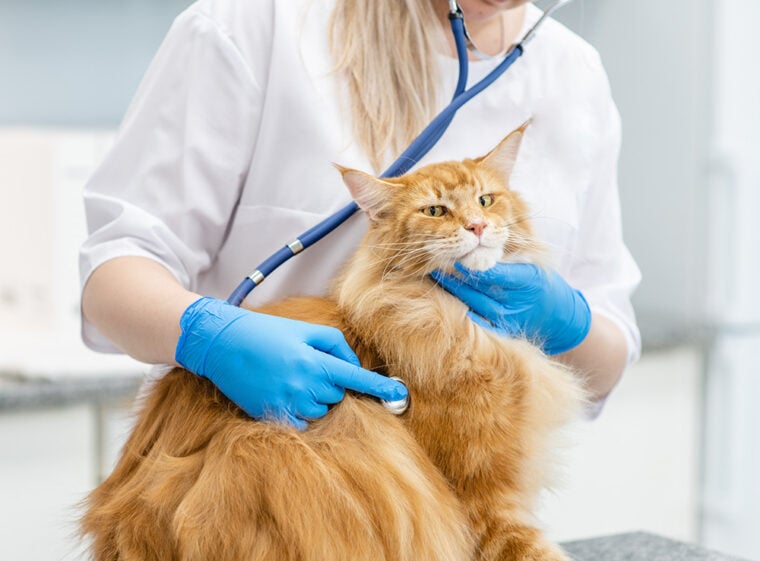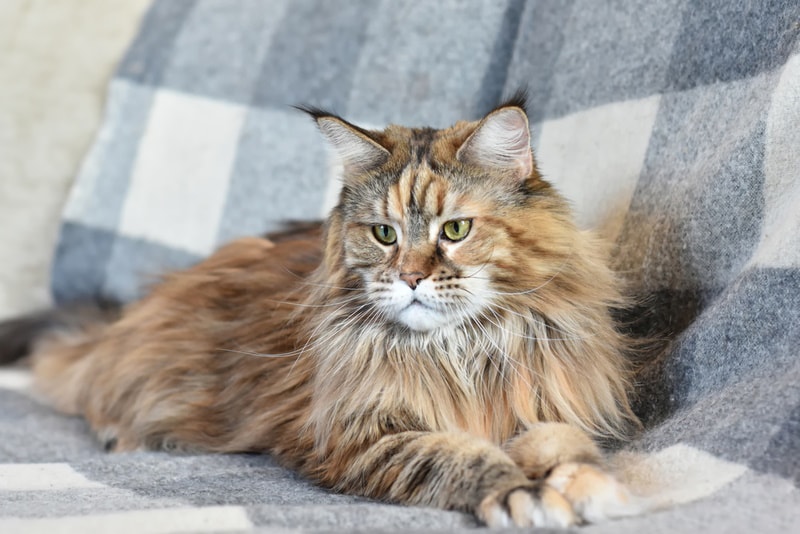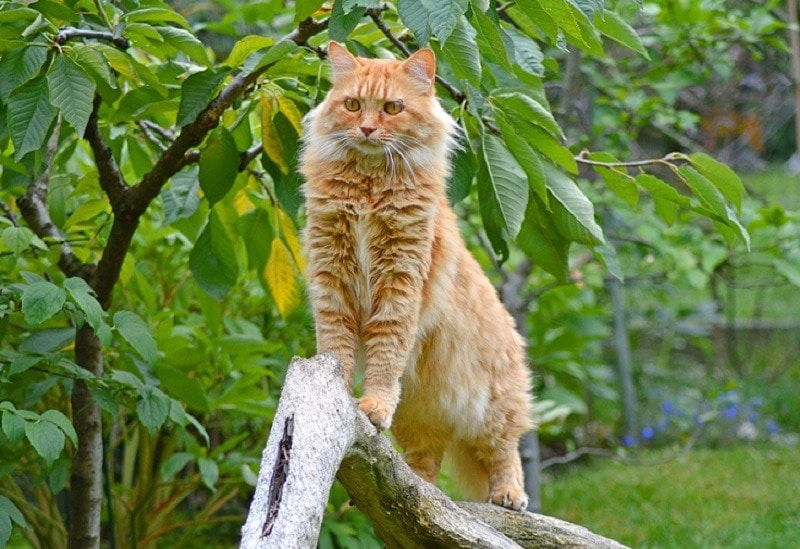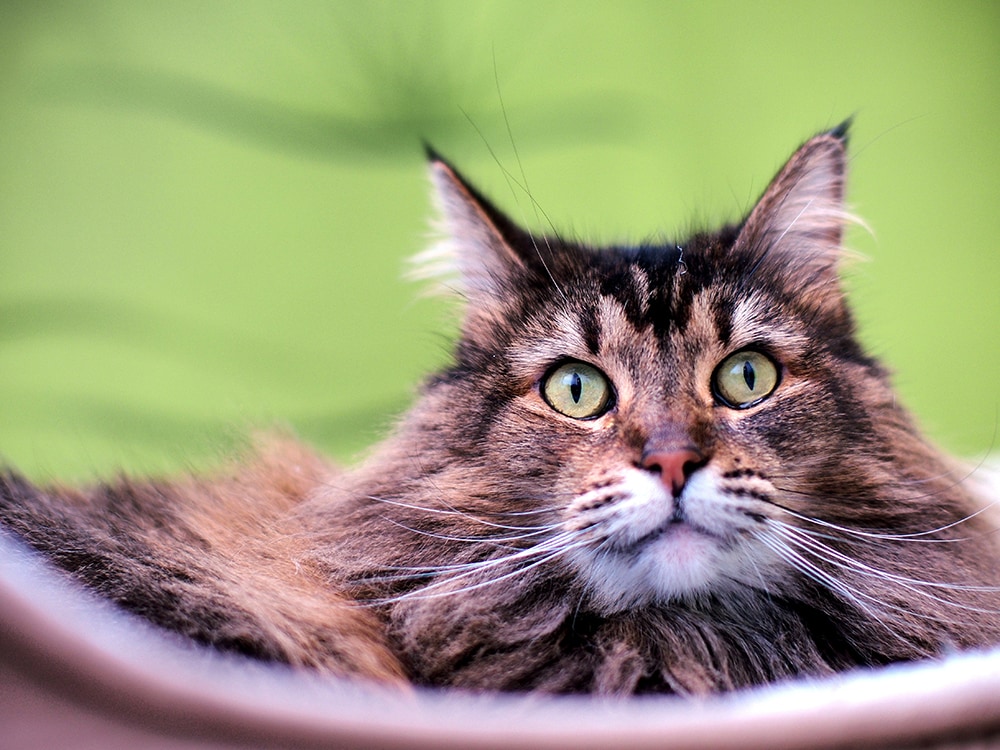
Maine Coon cats are big, hardy cats, but that doesn’t mean that they’re always in perfect health. In fact, there are quite a few health issues that are common among Maine Coon cats—either because they’re genetically linked or because they’re inherent risks in larger breeds.
Even though most Maine Coon cats won’t have serious health problems, knowing what to look out for—big and small—can help your cat live a healthy, long life.

The 6 Maine Coon Health Problems
1. Hip Dysplasia
Hip dysplasia is a rare condition in cats caused by misshapen hip joints that lead to joint stress and pain. Although it’s relatively uncommon, it occurs mostly in larger cats like Maine Coons, and some doctors estimate that up to 18% of Maine Coon cats suffer from the disease. It’s caused by a combination of genetic and environmental factors. It is characterized by deteriorating hip joints that lead to inflammation and pain.
Prevention and Treatment
Because hip dysplasia is mostly genetic, look for ethical breeders that avoid breeding unhealthy cats. If your cat develops hip dysplasia, treatment can involve surgery in major cases and a range of therapies in less severe cases. Physiotherapy exercises can strengthen joints and muscles. Obesity is a major compounding factor that worsens hip dysplasia.

2. Hypertrophic Cardiomyopathy
Cats with hypertrophic cardiomyopathy (HCM) have abnormal hearts with thickened walls that constrict blood flow through the heart. The exact cause is unknown, but it is believed to have a genetic component. Cats with HCM may have stamina issues or signs of heart distress and are at a high risk of sudden heart failure.
Prevention and Treatment
This is a genetic disease that can only be prevented by ethical breeding. Cats with the condition can be treated with medications that decrease the likelihood of heart failure. Cats with HCM may go on to live several years after diagnosis with minimal symptoms.
3. Obesity
Although all types of cats are susceptible to obesity, large-framed cats like Maine Coons are especially in danger. Maine Coon cats also have long fur that may disguise mild obesity. The easiest way to tell if your cat is being overfed is to weigh your cat regularly—a healthy Maine Coon usually weighs between 12 and 18 pounds depending on size. Obesity can lead to difficulty exercising and grooming and exacerbate or cause many other dangerous health conditions.
Prevention and Treatment
Feeding your cat a consistent amount of healthy food each day and encouraging activity is the best way to prevent obesity. Once your cat reaches full growth—usually eighteen months to two years in Maine Coons—weigh your cat regularly and adjust as needed. A vet can help you find your cat’s ideal weight. Many cats need less food as they age, and their metabolism slows.

4. Spinal Muscular Atrophy
Spinal muscular atrophy is a debilitating and serious disease found mainly in Maine Coon cats. It is a recessive genetic disease that is not threatening but is generally debilitating and untreatable. Cats with spinal muscular atrophy will have restricted mobility and require careful care. It manifests at about 3–4 months of age.
Prevention and Treatment
A genetic test is available that can identify carriers and affected cats, allowing spinal muscular atrophy to be bred out of cats. There is no treatment for affected cats. They should be kept indoors, and adaptations may be made to help them function with their disability.
5. Stomatitis
Stomatitis is a severe inflammation of the mouth and gums that causes great pain to cats. Its cause is unknown. It may be an immune system response to oral bacteria.
Prevention and Treatment
In mild cases, stomatitis may be treated by regular at-home and veterinary dental cleaning. However, the relief is usually temporary, and many cases require more severe treatment. Surgery to remove some or all of your cat’s teeth can eliminate signs in most cases. Leading up to and after surgery, cats should eat soft canned foods. Although this might seem extreme, tooth removal is often your cat’s best chance at a pain-free life.

6. Polycystic Kidney Disease
Polycystic kidney disease is a rare genetic disease that causes cysts to form over a cat’s kidneys. Although these cysts are present throughout the cat’s life, it takes some years for signs to appear. This disease is most common in Persian cats and probably ended up in the Maine Coon gene pool due to crossbreeding.
Prevention and Treatment
Polycystic kidney disease can be diagnosed via gene tests or ultrasound. Responsible breeding is the best way to prevent polycystic kidney disease. If your cat is diagnosed with the disease, there isn’t any cure, but the signs can be managed through a combination of diet changes and medications. The severity of this disease varies from cat to cat—some cats with this disease never experience kidney failure, while others develop kidney issues at a younger or older age.

Final Thoughts
All pet owners want to be aware of any potential health issues their beloved companion might suffer from in the future. Understanding what your Maine Coon is susceptible to can help you be aware of early signs so you can get them treated.
Featured Image Credit: Ermolaev Alexander, Shutterstock






